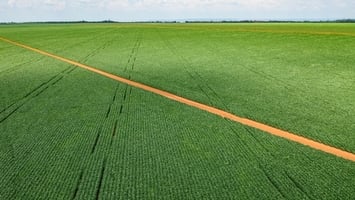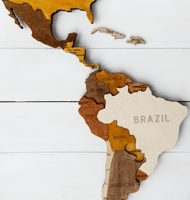Latin America is a major producer and exporter of soybeans, making the region's soybean market a...
10 Largest milk producers in Brazil
The Brazilian milk production industry has encountered a challenging phase characterized by fluctuations in production and rising production costs, influenced by global factors. Despite years of steady expansion, the past two years have witnessed a notable decline in milk production, attributed to the conflict between Russia and Ukraine, resulting in heightened prices for agricultural commodities and oil. This surge in costs has led to a substantial 62% increase in the Milk Production Cost Index (ICPLeite) over the last couple of years, impacting producer prices and diminishing annual milk consumption per capita.
However, there are glimpses of a turnaround on the horizon. The latter half of 2022 brought about some relief, with a gradual decrease in production costs, largely due to the decreased cost of concentrated feed for cows. The future outlook remains uncertain, with a mix of challenges and opportunities as the Brazilian market works towards balancing supply and demand, bolstered by improvements in the job market and income levels. Additionally, the current robust grain production in Brazil could alleviate some of the pressure on feed costs for dairy cows.
Despite these positive developments, internal and external uncertainties linger. Potential shifts in government policies and the global economic slowdown pose ongoing risks for the sector. The fluctuating international landscape, including commodity price variations, adds further complexity to the industry's outlook.
In essence, the Brazilian milk market has weathered a tumultuous period marked by production fluctuations and escalating costs caused by global influences. While there are indications of a rebound, the industry must remain adaptable and resilient in the face of continued economic uncertainties, both domestically and internationally.
FAZENDA COLORADO
Fazenda Colorado is the largest milk producers in Brazil, has its headquarters located in Araras, in the interior of São Paulo;
Fazenda Colorado has a herd of more than 2,100 pure Holstein cows in lactation, which produce up to 92 thousand kilos of milk per day;
They have more than 230 employees and is responsible for the production of Xandô type A milk, marketed in whole, low-fat, light and zero lactose versions.
Link: https://www.fazendacolorado.com.br/
FAZENDA MELKSTAD
Lovated in Carambeí, state of Paraná, with over 200 employees Melkstad Agropecuária, head of Fazenda Melkstad, is the second largest milk producer in Brazil.
Acording to the 2023 ranking of largesrts milk producers in Brazil, they commercialized in 2022 around 30.5 million liters of milk and reached an average production of over 83 thousand liters a day.
Link: https://melkstad.com.br/
FAZENDA SÃO JOSÉ
Fazenda São José, located in Tapiratiba, has a herd of 6,000 dutch cows and a production of more than 77,000 liters of type A milk per day and 28 million per year; The farm has a complete structure with maternity for the birth of calves;
The milking parlor has the capacity to mechanically milk 500 animals per hour and is built 100% with stainless steel, it is unique in Brazil. Each animal is milked two to three times a day and produces an average of 25 liters of milk.
SEKITA AGRONEGÓCIOS
With more than 30 years in the market and with about 600 employees, Agropecuária has a herd of more than 1800 lactating cows of the Dutch breed and a daily production of more than 75 thousand liters of milk per day;
Besides milk production, they commercialize a wider range of agricultural products.
Link: http://www.sekita.com.br/
FAZENDA SANTA RITA
Founded in 1945, located in Descalvado in the interior of São Paulo, Agrindus directly employs more than 200 employees, farms 1,200 hectares and operates in the intensive livestock model with dairy cattle, beef cattle and poultry;
They are among the largest milk producers in Brazil, have a large registered herd of Dutch cows, being pioneers in A2 milk production and the farm has 3 important certifications: Green Seal, A2A2 cows certificate and Animal Welfare Seal.
Link: https://agrindus.com.br
CHÁCARA TINA
Located in the city of Castro, in the state of Paraná, the company's main activity is soybean cultivation. It also works with the breeding of dairy cattle, being one of the largest producers in the country with an average daily production of about 60 thousand liters per day;
In addition, Chacará operates in pig breeding and cultivation of other species of agricultural products.
FAZENDA MORRO VERMELHO E TRÊS LAGOAS
Fazenda Morro Vermelho E Três Lagoas has a large and diversified herd, being among one of the largest milk producers in Brazil;
The farm, located in the city of Tiros, state of Minas Gerais, has an average daily production of about 54 thousand liters per day;
In addition to the herd and milk production, the farm grows other agricultural crops extensively.
FAZENDA COBIÇA
Founded in the 1970s and located in Três Corações, Minas Gerais, Brazil, Fazenda Cobiça is dedicated to milk production with a herd of 2,000 Holstein animals, including 900 lactating cows;
The farm is known as one of the most productive dairy farms in Brazil and has a strong focuson the use of technology for process improvement.
AGROPECUÁRIA RÉGIA
The farm has an area of 1000 hectares destined to the production of fodder and grains, integrating livestock and agricultural activity. The current daily production is 32 thousand liters of milk, with 800 lactating cows;
The total herd is 1900 animals of the Holstein breed, the result of 50 years of genetic selection. The property invests in state-of-the-art technologies, such as a milking carousel that allows the simultaneous milking of 32 cows.
FAZENDA SANTA LUZIA
Fazenda Santa Luzia in Passos, MG, is one of the largest milk producers in Brazil, with a daily production of 45,000 liters of milk, annual revenues of about R $ 24 million, with a herd of about 6,000 animals, intensive pasture system;
It was founded in 1943, with a focus on the genetic selection of Girolando Cattle, today it uses 100% IVF (in vitro fertilization) reproduction. This shows that the farm has a focus on technology, animal welfare and sustainable practices.



